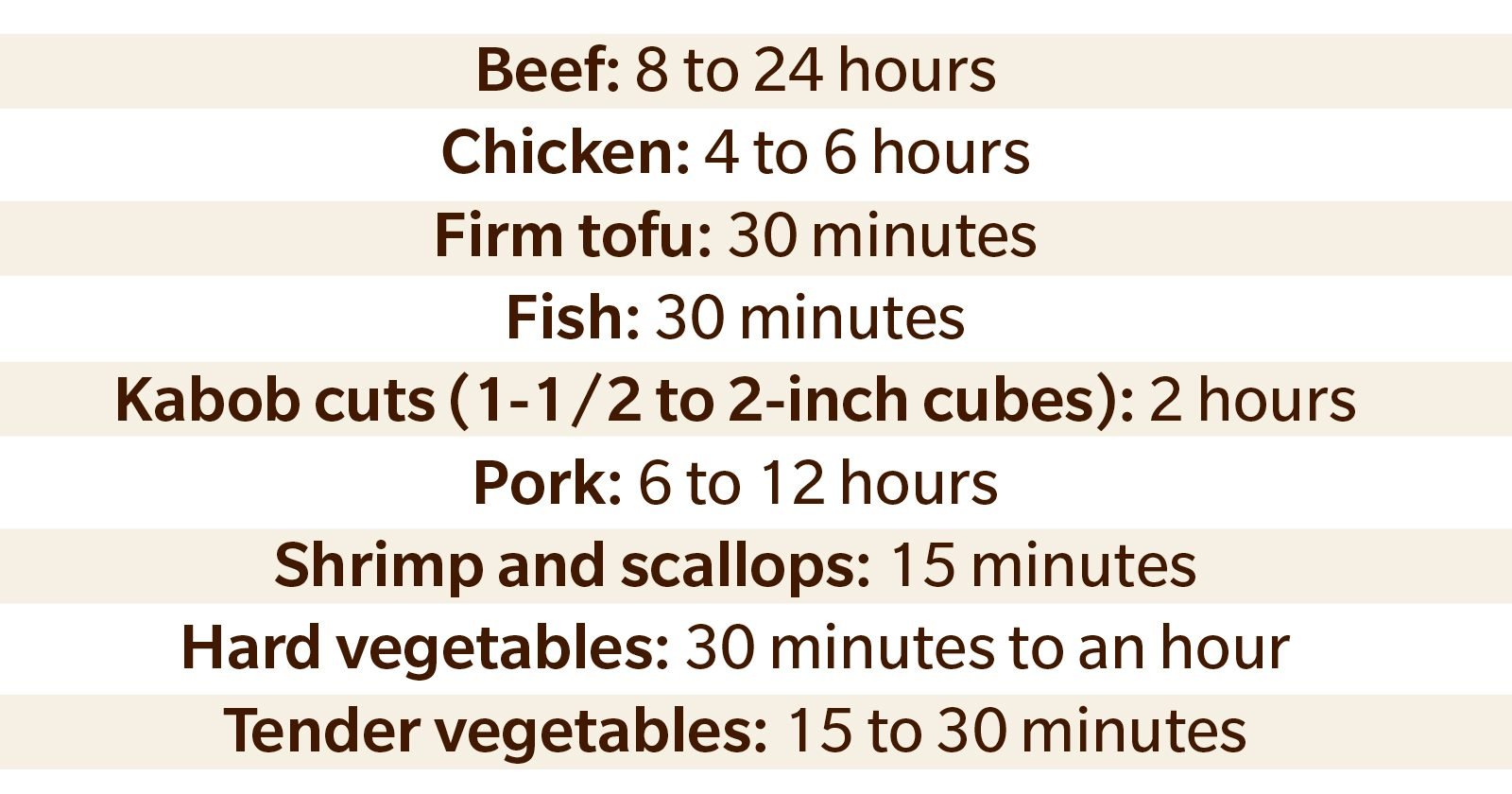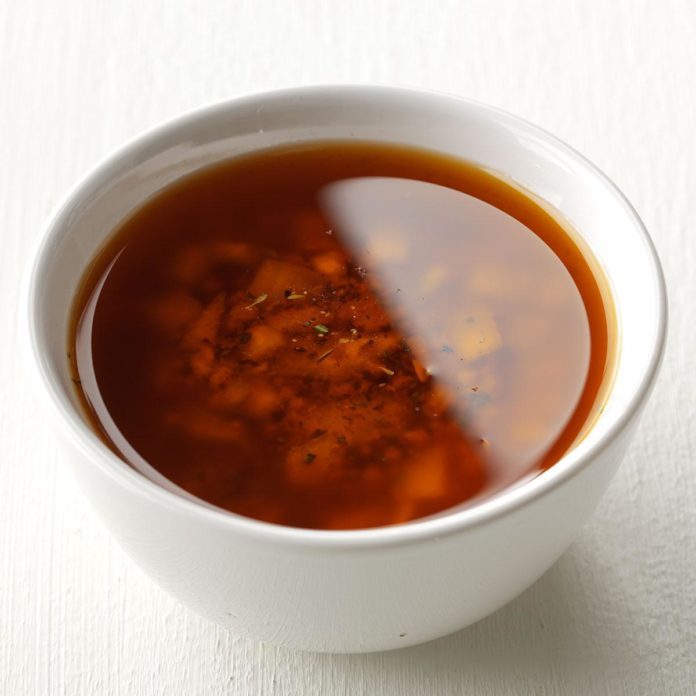Using a marinade is an easy way to boost the flavor of lean proteins, infuse flavor into vegetables or ensure tough cuts of meat will turn out tender and juicy. Even 15 minutes of soaking time is enough to enhance the flavor of many ingredients. The best part? It’s super easy to whip together a marinade, and you don’t need any special equipment.
What Is a Marinade?
A marinade is a flavorful liquid that’s used for soaking meat, poultry, seafood and vegetables. It tenderizes the surface of the meat while also infusing it with extra flavor. What a marinade won’t do is season the inside of a large cut of meat; unlike brine, it can’t penetrate much further than a few millimeters below the meat’s surface. But it can break down tough proteins on the meat’s surface, and the oil used in marinades helps the flavorings stick to the meat’s exterior.
Is Marinating Necessary?
It might not be necessary, but it is a good idea when working with tougher cuts of meat. Beef steaks like flank and skirt turn out juicier and more tender when marinated overnight. We also like marinating lean proteins like chicken breasts and shrimp, which can turn out dry and bland when cooked without seasoning. The marinade gives them extra fat from the oil, and the seasonings coat the exterior to boost their flavor. Tender vegetables like zucchini or eggplant are also great targets for a marinade. When cut into small pieces, they’ll soak up the flavors of the marinade really effectively, making them really shine on the grill.
Basic Marinade Ingredients
All marinades share a few key parts: oil, salt and acid. Oil lets the marinade ingredients stick to the food’s surface while salt helps the meat retain moisture. The acidic component—like vinegar or citrus juice—tenderizes the meat’s surface by breaking down tough muscle fibers. It’s helpful to use sugar, honey or maple syrup as well, because they help promote browning as ingredients cook.
You’ll also find several flavoring ingredients in marinades, like spices and herbs, vegetables like onions, garlic and ginger, or condiments like Worcestershire, soy sauce, ketchup and mustard. These components might not be able to penetrate into the inside of the meat, but they’ll stick to the surface after the meat or vegetables are removed from the marinade.
Easy Marinade Recipes
We have a ton of easy marinade recipes, but here are a few of our favorites. They’re all-purpose marinades, so you can use them for meat, poultry, seafood and vegetables. To make these marinades, mix the sauce in a shallow dish, toss in the ingredient you want to marinate and rest it in the fridge.
Huli Huli Marinade
- 1 cup packed brown sugar
- 3/4 cup ketchup
- 3/4 cup reduced-sodium soy sauce
- 1/3 cup sherry or chicken broth
- 2-1/2 teaspoons minced fresh ginger
- 1-1/2 teaspoons minced garlic
Northwoods Marinade
- 6 tablespoons maple syrup
- 6 tablespoons balsamic vinegar
- 3/4 teaspoon kosher salt
- 3/4 teaspoon coarsely ground pepper
Honey-Garlic Marinade
- 1/4 cup lemon juice
- 1/4 cup honey
- 2 tablespoons soy sauce
- 2 minced garlic cloves
Orange-Spice Marinade
- 1/2 cup thawed orange juice concentrate
- 1/4 cup honey
- 1/4 cup soy sauce
- 1 teaspoon Chinese five-spice powder
- 1/2 teaspoon garlic powder
Ranch Marinade
- 2 cups sour cream
- 1 envelope ranch salad dressing mix
- 4 teaspoons lemon juice
- 4 teaspoons Worcestershire sauce
- 2 teaspoons celery salt
- 2 teaspoons paprika
- 1 teaspoon garlic salt
- 1 teaspoon pepper
Heavenly Greek Marinade
- 1/3 cup lemon juice
- 2 tablespoons olive oil
- 4 teaspoons grated lemon zest
- 2 minced garlic cloves
- 1 teaspoon dried oregano
- 1/4 teaspoon kosher salt
- 1/4 teaspoon pepper
Southwest Chili Marinade
- 2 tablespoons olive oil
- 1 tablespoon chili powder
- 1 teaspoon garlic salt
- 1 teaspoon ground coriander
- 1 teaspoon dried oregano
- 1/2 teaspoon ground cumin
- 1/2 teaspoon pepper
Balsamic Mustard Marinade
- 1-1/4 cups balsamic vinaigrette
- 4 teaspoons ground mustard
- 2-1/4 teaspoons Worcestershire sauce
- 2 minced garlic cloves
Ginger-Peach Marinade
- 1/4 cup peach preserves
- 1 tablespoon lemon juice
- 1 tablespoon finely chopped crystallized ginger
- 2 teaspoons grated lemon zest
- 1/8 teaspoon ground cloves
Tangy Barbecue Marinade
- 1 cup barbecue sauce
- 1/2 cup burgundy wine or beef broth
- 1/4 cup lemon juice
Psst: You can also learn how to make a marinade from scratch.
Essential Tools You’ll Need
The only thing you really need is a suitable container. Yes, plastic bags will work, but reusable containers are certainly more eco-friendly. Look for ones with locking lids that allow you to flip the container or shake the contents to evenly disperse the marinade. Be sure to use nonreactive materials like glass, plastic or stainless steel, as the acidic components in the marinade can create metallic flavors when using aluminum or copper.
For quick marinating jobs, look to a vacuum sealer. Vacuum sealing lowers the pressure inside the bag, allowing the meat to absorb the marinade more quickly. If a vacuum sealing machine isn’t in the budget, you can also use a hand-pump marinating container.
How Long to Marinate Vegetables and Meat
It’s easy to overmarinate meats and vegetables because they usually don’t need as much time as you’d think. Also, keep in mind that cut meats and vegetables don’t need to marinate as long as whole steaks or roasts.
| Beef: | 8 to 24 hours |
|---|---|
| Chicken: | 4 to 6 hours |
| Firm tofu: | 30 minutes |
| Fish: | 30 minutes |
| Kabob cuts (1-1/2 to 2-inch cubes): |
2 hours |
| Pork: | 6 to 12 hours |
| Shrimp and scallops: | 15 minutes |
| Hard vegetables: | 30 minutes to an hour |
| Tender vegetables: | 15 to 30 minutes |
Can You Make a Marinade in Advance?
Making marinades in advance is a great way to meal prep. Most marinades can be made several days in advance and stored in airtight containers or mason jars in the refrigerator. If you really want to plan ahead, make several batches of marinade at once and portion them into gallon-sized bags. Freeze the marinade for up to six months, thawing the bag in the refrigerator before using.
Can You Marinate Something for Too Long?
Yes, you can definitely marinate meats for too long, and unfortunately, there’s no coming back when you do. Marinades contain acidic ingredients that break down meat proteins. When the meat is exposed to the marinade for extended periods of time, it can become mushy and textually unpleasant. For best results, set a timer and stick to the marinade times in the chart above. Learn more surprising facts about marinating.
The post Your Complete Guide to Marinades appeared first on Taste of Home.
Lindsay D. Mattison























